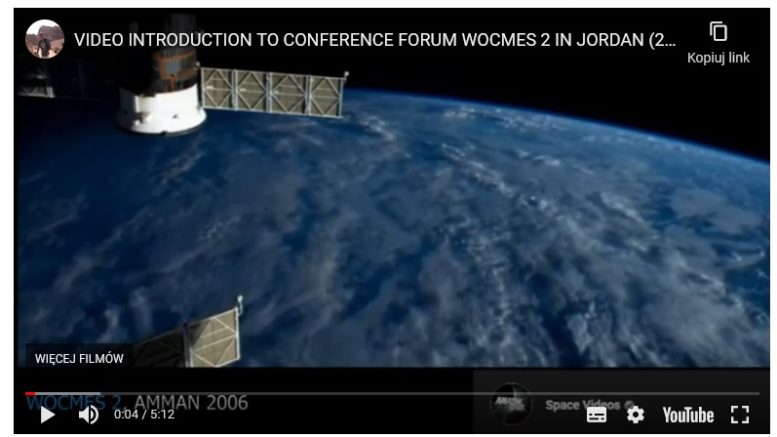Second World Congress for Middle Eastern Studies (WOCMES 2) odbywał się w Ammanie w dniach od 11 do 16 czerwca 2006 roku. Głównym organizatorem był Royal Institute for Inter-Faith Studies w Jordanii.
Poniżej prezentujemy skrót video tego wydarzenia.
Innymi partnerami tego naukowego forum bliskowschodniego były takie instytucje jak Majlis El Hassan, Instituto Cervantes in Jordan, The Konrad Adnenauer Stiftung, French Cultural Centre in Jordan, Bridges-Josour, Royal Holloway College, University of London and Unesco in Jordan.
Kongres zebrał ponad tysiąc ( dokładnie 1400) oficjalnych uczestników, nie licząc audytorium słuchaczy i innych gości. Nad całością forum czuwała grupa woluntariuszy z Jordanii, Egiptu, USA i innych krajów.
Na wstępie Kongresu wystąpił Książę El-Hassan Bin Talal, prezydent Royal Institute for Inter-Faith Studies (RIIFS) and prezydent Wocmes 2.
Instytut Królewski Badań Między Religiami (RIIFS) został założony w 1994 roku w Ammanie, którego celem jest dostarczanie naukowej wiedzy interdyscyplinarnej o interakcjach między różnymi kulturami i cywilizacjami. W świecie arabskim te interakcje dotyczą głównie relacji pomiędzy światem islamu, a chrześcijaństwem.
Sekretarzem generalnym WOCMES 2 był Baker al-Hiyari, deputy director of RIIFS. W tym czasie Prezydentem the International Council of the World Congress for Middle Eastern Studies był Günter Meyer.
W czasie forum odbyło się około 200 paneli sesyjnych i kilkakrotnie więcej wystąpień naukowych, prezentowanych przez naukowców z całego świata.
Panele naukowe odbywały się w hotelu Meridien, a inne imprezy kulturalne w Royal Cultural Center, Al-Hussein Cultural Center i innych miejscach.
W ramach forum panele naukowe prezentowali także partnerzy z The Konrad Adnenauer Stiftung i Unesco.
W pawilonie hotelu Le Meridien rozlokowane były różne wydawnictwa, prezentujące książki, czy instytuty takie jak Al Quds Center for Political Studies w Ammanie.
Na światowym forum WOCMES 2 pojawiła się także liczna grupa naukowców i studentów z Polski, m.in. z Uniwersytety Jagiellońskiego i Uniwersytetu Warszawskiego.
Całość wystąpień dopełniały różne wydarzenia kulturalne i cykliczne w Ammanie, jak Tour of Amman Art Galleries, Tradition on Costumes and Textiles in Bilad Al-Sham, czy 12 Edycja Franco-Arab Film Festival.
W czasie forum odbyło się także spotkanie w Ambasadzie Polskiej w Ammanie z udziałem gości z różnych krajów.
Dodatkowo część gości mogła zapoznać się z bogatym dziedzictwem kulturowym i historycznym Jordanii. Między innymi można było odwiedzić Górę Nebo, Madabę, Hipodrome w Jerash, czy Morze Martwe.
——————————————————————————————————————————————————
ENGLISH VERSION
The Second World Congress for Middle Eastern Studies (WOCMES 2) took place in Amman from June 11 to June 16, 2006. The main organizer was the Royal Institute for Inter-Faith Studies in Jordan.
Other partners of this scientific forum of the Middle East were such institutions as Majlis El Hassan, Instituto Cervantes in Jordan, The Konrad Adnenauer Stiftung, French Cultural Center in Jordan, Bridges-Josour, Royal Holloway College, University of London and Unesco in Jordan.
Congress gathered over a thousand (exactly 1,400) official participants, not counting the auditorium of listeners and other guests. Forum was there organizationally supported by a group of volunteers from Jordan, Egypt, the USA and other countries.
The introduction of the Congress was given by Prince El-Hassan Bin Talal, president of the Royal Institute for Inter-Faith Studies (RIIFS) and president WOCMES 2.
The Royal Institute for Inter-Faith Studies (RIIFS) was founded in 1994 in Amman, of which the goal is to provide scientific interdisciplinary knowledge about interactions between different cultures and civilizations. In the Arab world, these interactions are about mainly the relationship between the world of Islam and Christianity.
The secretary general of WOCMES 2 was Baker al-Hiyari, deputy director of Riifs. At that time, President of the International Council of the World Congress for Middle Eastern Studies was Günter Meyer.
During the forum, about 200 session panels and several times more scientific presentations were held, presented by scientists from around the world.
Scientific panels were held at the Meridon Hotel, and other cultural events at the Royal CuLtural Center, Al-Hissein Cultural Center and other places.
As part of the forum, scientific panels were also presented by partners from The Konrad Adnenauer Stiftung and Unesco.
The Le Meridien Hotel pavilion had various publishing houses presenting books or institutes such as the Al Quds Center for Political Studies in Amman.
On the WOCMES 2 global forum also appeared a large group of scientists and students from Poland, including people from the Cracow Jagiellonian University and the University of Warsaw.
The whole performance was complemented by various cultural and cyclical events in Amman, such as Tour of Amman Art Galleries, Tradition on Costumes and Textiles in Bilad Al-Sham, or 12 Edition of the Franco-Arab Film Festival.
During the forum, a meeting was also held at the Polish Embassy in Amman with the participation of guests from various countries.
In addition, some guests could learn about Jordan’s rich cultural and historical heritage. Among other things, we could visit Mount Nebo, Madaba, Hippodrome in Jerash or the Dead Sea.
